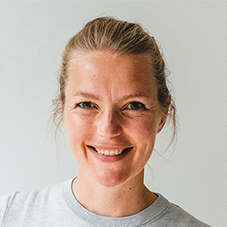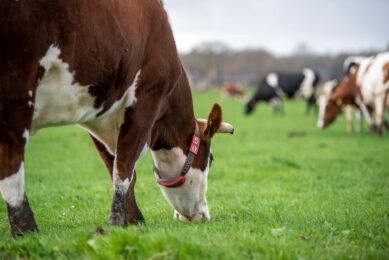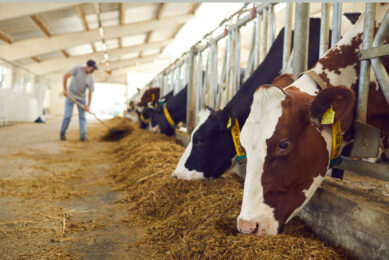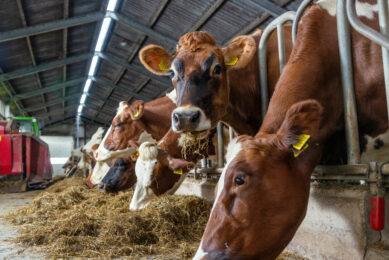3 scenarios to lower methane output
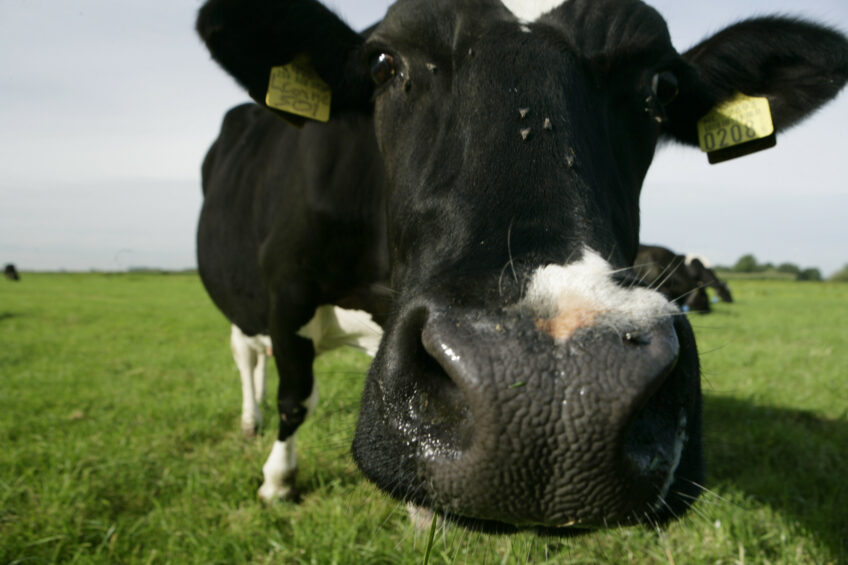
When aiming for a more environmental friendly dairy farm, it makes sense to increase longevity of the dairy herd. This was shown by calculations from the Belgium research institute ILVO.
Dairy farming is an important contributor of methane gas into the environment. Methane gas (CH4) is a much stronger greenhouse gas than CO2 for example. Reducing methane ouput from agriculture is therefore high on the agenda. This can be accomplished by certain feeding strategies and feed additives. But also management is an important key factor to reduce methane output.
Older cows and earlier calving
ILVO has been doing methane research for more than 10 years, using the so-called gas exchange chambers (GUKs). These chambers measure the emission of individual animals. ILVO also monitors methane emissions in groups of animals (lactating and dry cows) with specific measuring equipment (called GreenFeeds) in a research farm.
Different scenarios have been studied to lower the methane emission. A few of them are listed here.
 Lower the age of first calving. Lowering the age at first calving from 26 to 24 months (on a farm with 80 young cattle per 100 dairy cows and a livestock population with a production of 27kg of milk per day). Showed a reduction of 3.1% of total methane emissions. If the calving age decreases from 28 to 22 months, under the same conditions, the total methane emission is even reduced by 8.8%.
Lower the age of first calving. Lowering the age at first calving from 26 to 24 months (on a farm with 80 young cattle per 100 dairy cows and a livestock population with a production of 27kg of milk per day). Showed a reduction of 3.1% of total methane emissions. If the calving age decreases from 28 to 22 months, under the same conditions, the total methane emission is even reduced by 8.8%. Increase milk production. When a cow produces more milk, it also consumes more feed, hence leading to more methane output. However, because the efficiency of milk production improves, the total methane emission per kg of milk is decreased. Increasing milk production from 27 to 30 kg of milk per day, total methane emission per cow is increased by an average of 3%. But the emission per kg of milk decreases up to 8.4%.
Increase milk production. When a cow produces more milk, it also consumes more feed, hence leading to more methane output. However, because the efficiency of milk production improves, the total methane emission per kg of milk is decreased. Increasing milk production from 27 to 30 kg of milk per day, total methane emission per cow is increased by an average of 3%. But the emission per kg of milk decreases up to 8.4%.
 Increase longevity. Older cows produce more milk which in turn can increase the efficiency and methane output per kg of milk (see point 2). It was calculated that if 5% less cows are being replaced by the farmer in combination with a production rise of 3kg per cow per day, a reduction in methane emissions of 11.7% per kg of milk can be seen.
Increase longevity. Older cows produce more milk which in turn can increase the efficiency and methane output per kg of milk (see point 2). It was calculated that if 5% less cows are being replaced by the farmer in combination with a production rise of 3kg per cow per day, a reduction in methane emissions of 11.7% per kg of milk can be seen.
Conclusion
ILVO showed that there are various scenarios, besides nutrition and feed additives, that a farmer can work on to lower methane output of the dairy herd. Many of these management changes will also benefit the farmer financially.
Source: ILVO
Join 13,000+ subscribers
Subscribe to our newsletter to stay updated about all the need-to-know content in the dairy sector, two times a week.


